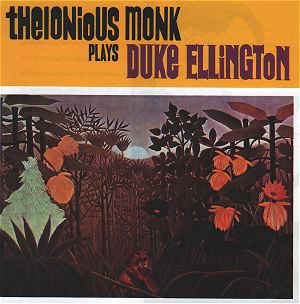1. It Don't Mean a Thing (If It Ain't Got That
Swing)
2. Sophisticated Lady
3. I Got It Bad (And That Ain't Good)
4. Black and Tan Fantasy
5. Mood Indigo
6. I Let a Song Go Out of My Heart
7. Solitude
8. Caravan
Thelonious Monk - Piano
Oscar Pettiford - Bass
Kenny Clarke - Drums
The
link between Thelonious Monk and Duke Ellington
is a clear yet subtle one. The two men's playing
comes together in the work of Stan Tracey,
who somehow managed to combine their same-but-different
styles. Tracey probably recognised the links
between the two men: particularly their harmonic
daring, since Duke's adventurous approach
to chords is reflected in this album by Thelonious,
who always seemed to be in search of new voicings.
Monk's playing here is also a mixture of sparseness
and florid runs, which matches Ellington's
similar mixture of opposites. We so often
hear Monk playing his own compositions that
it is refreshing and novel to hear his interpretation
of eight Ducal themes.
A
tune like Sophisticated Lady makes
the comparisons crystal clear, since Monk's
interpretation emphasises the minor shifts.
This album, produced by Orrin Keepnews, was
actually recorded in 1955 and was Monk's first
album for the Riverside label but it still
sounds fresh because of Monk's exploratory
approach to the Ellington tunes. Savour the
way he carefully treads a path through I
Got It Bad, starting with tentative exploration
before he breaks into bouncy swing, backed
by Oscar Pettiford's sturdy double bass. The
exploration process is backed up by Orrin
Keepnews's liner notes which describe how,
at the recording session, Thelonious "set
up the sheet music, and hesitantly began to
work out melody lines as if he were seeing
the music for the first time".
Oscar
Pettiford gets several bass solos but Kenny
Clarke's drums are virtually inaudible on
most tracks, although you can hear his Latin-American
rhythms on Caravan. In fact the spotlight
is firmly on Thelonious for most of the album
and it reveals what a fascinating improviser
he could be when tackling someone else's compositions.
The sleeve notes suggest that the choice of
recording a whole album of Ellington tunes
was motivated by a desire to present Thelonious
in a more user-friendly light than some of
his more way-out recordings. The tunes are
certainly recognisable, but the treatment
is entirely Monk.
Tony Augarde
